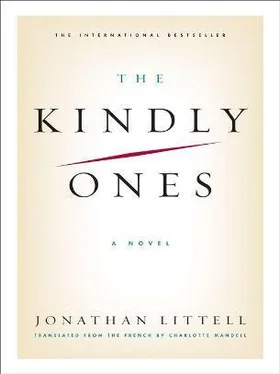Coat and kit under my arm, I went back out into the hallway and found the Untersturmführer: “The Leiter IV, please?”—“This way.” I followed him to a little room cluttered with desks, papers, crates, files, with candles stuck on every available surface. An officer raised his head: it was Thomas. “Well,” he said happily, “it’s about time.” He got up, skirted round the table, and warmly shook my hand. I looked at him, speechless at first. Then I said: “But what are you doing here?” He spread his arms; as was his habit, he was impeccably turned out, freshly shaved, his hair combed with brilliantine, his tunic buttoned up to the neck, with all his decorations. “I volunteered, Max. What have you brought us to eat?” I opened my eyes wide: “To eat? Nothing, why?” His face took on a horrified expression: “You’ve just come from outside of Stalingrad and you haven’t brought anything to eat? You should be ashamed. Didn’t anyone explain to you the situation, here?” I bit my lip, I couldn’t tell if he was joking: “Actually, it didn’t occur to me. I told myself that the SS would have whatever they needed.” He briskly sat back down and his voice took on a mocking tone: “Find yourself a free crate. You should know that the SS controls neither the planes nor what they bring. We receive everything from the AOK, and they distribute our rations to us at the standard rate, which is, right now”—he searched his desk and pulled out a piece of paper—“two hundred grams of meat, usually horse, per man per day, two hundred grams of bread, and twenty grams of margarine or fat. Needless to say,” he went on as he put the paper down, “one could do with more.”—“You don’t look too badly off,” I remarked. “Yes, well, fortunately, some people are more provident than you. And also our Ukrainian boys are pretty resourceful, especially if you don’t ask them too many questions.” I pulled some cigarettes out of my jacket pocket and lit one. “At least,” I said, “I brought some smokes.”—“Ah! You see, you’re not such a simpleton. So, apparently you ran into some trouble with Bierkamp?”—“In a way, yes. A misunderstanding.” Thomas leaned forward a little and shook a finger: “Max, I’ve been telling you for years now to tend to your relations. One day it’ll end badly.” I made a vague gesture toward the door: “You could say it’s already ended badly. And also I should point out that you’re here too.”—“Here? It’s fine here, aside from the grub. Afterward, there will be promotions, decorations, e tutti quanti . We’ll be real heroes and we can parade our medals at the finest soirées . They’ll even forget your little troubles.”—“You seem to be omitting one detail: between you and your soirées , there are a few Soviet armies. Der Manstein kommt , but he hasn’t arrived yet.” Thomas made a scornful face: “You’re a defeatist, as always. What’s more, you’re not well informed: der Manstein isn’t coming anymore; he gave Hoth the order to retreat several hours ago. With the Italian front collapsing, they need him elsewhere. Otherwise we’ll lose Rostov. In any case, even if he had reached us, there wouldn’t have been an order to evacuate. And without orders, Paulus would never have budged. This whole business with Hoth, if you want my opinion, was just for show. So that Manstein could have a good conscience. And the Führer too, for that matter. All that’s to say that I never counted on Hoth. Give me a cigarette.” I handed him one and lit it for him. He exhaled for a long time and threw himself back on his chair: “The indispensable men, the specialists, will be evacuated just before the end. Möritz is on the list—me too, of course. Obviously, some will have to stay to the end to hold down the shop. That’s called being out of luck. The same goes for our Ukrainians: they’re screwed and they know it. It makes them mean, and they take their revenge in advance.”—“You could get yourself killed first. Or even when you leave: I saw that quite a few planes weren’t making it.” He smiled widely: “That, my friend, is an occupational hazard. You can also get yourself run over by a car when you’re crossing Prinz-Albrechtstrasse.”—“I’m happy to see you’ve lost none of your cynicism.”—“My dear Max, I’ve explained to you a hundred times that National Socialism is a jungle that functions according to strictly Darwinian principles. It’s the survival of the fittest or the cleverest. But you never want to recognize that.”—“Let’s just say that I have a different vision of things.”—“Yes, and look at the result: you’re in Stalingrad.”—“And you really asked to come here?”—“Before the encirclement, of course. Things didn’t seem to be going so badly in the beginning. And at the Group, it was getting rather dull. I had no desire to wake up as a KdS in some godforsaken hole in the Ukraine. Stalingrad offered interesting possibilities. And if I get out, it will have been worth it. Otherwise…” he laughed out loud. “C’est la vie.” —“Your optimism is admirable. And what about my own prospects?”—“You? That might be a little more complicated. If they sent you here, it’s because they don’t think you’re indispensable: you’ll agree with me on that. So for a place on the evacuation lists, I’ll see what I can do, but I can’t guarantee anything. Otherwise, you can always get yourself a Heimatschuss . Then we could manage to ship you out on priority. But be careful! Don’t get wounded too seriously; they only repatriate the ones who can be patched up to serve again. Speaking of which, we’re beginning to have quite a lot of experience with self-inflicted wounds. You should see what the guys invent, sometimes they’re very ingenious. Since the end of November, we’ve been shooting more of our own men than Russians. To encourage the others , as Voltaire once said about Admiral Byng.”—“But you’re not suggesting…” Thomas waved his hands: “No, no! Don’t be so gullible. I was just saying that because we were on the subject. Have you eaten?” I hadn’t thought about it since I had arrived in the city; my stomach grumbled. Thomas laughed. “Actually, not since this morning. In Pitomnik, they didn’t offer me anything.”—“People are losing all sense of hospitality. Come, let’s go put your things away. I had you bunk in my room, so I can keep an eye on you.”
Once I had eaten, I felt better. While I was swallowing a kind of broth in which vague scraps of meat were floating, Thomas had explained the gist of my duties: collecting gossip, rumors, and Latrinenparolen and reporting on the soldiers’ morale; fighting Russian defeatist propaganda; and maintaining a few informers, civilians, often children, who slipped from one line to the other. “It’s something of a double-edged sword,” he said, “because they give the Russians as much information as they report to us. And also they often lie. But sometimes they’re useful.” In our quarters, a narrow room furnished with a metal bunk bed and an empty ammunition crate with an enamel basin and a cracked mirror to shave with, he had brought me a reversible winter uniform, a typical product of German ingenuity, white on one side, feldgrau on the other. “Take that for your sorties,” he said. “Your coat is fine for the steppe; in town it’s much too heavy.”—“Can we go out?”—“You’ll have to. But I’ll give you a guide.” He led me to a guard room where some Ukrainian auxiliaries were playing cards and drinking tea. “Ivan Vassilievitch!” Three men raised their heads; Thomas pointed to one, who came out and joined us in the hallway. “This is Ivan. He’s one of my best. He’ll take care of you.” He turned to him and explained something to him in Russian. Ivan, a young, blond, rather slim youth with prominent cheekbones, listened to him attentively. Thomas turned back to me: “Ivan isn’t an ace at discipline, but he knows every nook and cranny of this city and he’s very trustworthy. Never go out without him, and outside, do anything he tells you, even if you don’t see why. He speaks a little German, you’ll be able to understand each other. Capisce? I told him that he was now your personal bodyguard and that he would have to answer for your life.” Ivan saluted me and went back into the room. I felt exhausted. “Go on, go to sleep,” Thomas said. “Tomorrow night, we’re celebrating Christmas.”
Читать дальше










